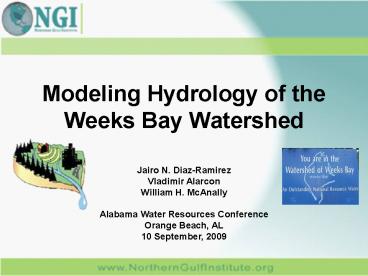Modeling Hydrology of the Weeks Bay Watershed
1 / 21
Title:
Modeling Hydrology of the Weeks Bay Watershed
Description:
Used successfully since 80's in USA, Canada, Europe, Australia, and Africa. ... The Weeks Bay watershed is primarily agricultural (47%) followed by forest land ... –
Number of Views:123
Avg rating:3.0/5.0
Title: Modeling Hydrology of the Weeks Bay Watershed
1
Modeling Hydrology of the Weeks Bay Watershed
Jairo N. Diaz-Ramirez Vladimir Alarcon William
H. McAnally Alabama Water Resources Conference
Orange Beach, AL 10 September, 2009
2
Our Team
Jairo N. Diaz-Ramirez, and William H.
McAnally Vladimir Alarcon
3
Outline
- Introduction
- Objective
- The BASINS/HSPF Model
- Study Area
- Model Setup
- Model Evaluation
- Model Results
- Summary
- Future Work
4
Introduction
A NOAA-sponsored cooperative institute led by
Mississippi State University in partnership
with University of Southern Mississippi Louisiana
State University Florida State
University Dauphin Island Sea Lab
5
Introduction
Watershed Modeling Improvements to Enhance
Coastal Ecosystems
- Goal Improve watershed-wide decision support for
resource management agencies
GIS
- Mobile River watershed
3-D Models
- Improved models
- Use the state-of-the-art technology
related to watershed simulation
HPC
- Habitat response evaluation
- System-wide perspective
Radar
Habitat
6
Objective
- Evaluate hydrologic processes on the Weeks Bay
watershed using the U.S. Environmental Protection
Agency Hydrological Simulation Program FORTRAN
(HSPF)
7
The BASINS/HSPF Model
BASINS (Better Assessment Science Integrating
point Non-point Sources), FR 1996
U.S. Environmental Protection Agency
http//www.epa.gov/waterscience/basins/
Data (Weather, water quality)
Tools (GIS, Met Generation)
Models (HSPF, SWMM, AQUATOX, WASP)
HSPF (Hydrological Simulation Program FORTRAN)
- Supported by EPA
- Modular program with capacity of simulation
hydrologic cycle, erosion, sediment transport,
nutrients, pesticides, and in-stream water
quality - Used successfully since 80s in USA, Canada,
Europe, Australia, and Africa.
8
HSPF Hydrological Components
9
HSPF Hydrologic Parameters
Parameters used by HSPF to simulate flow from a
pervious land without snow simulation
10
Study Area
11
Site Visits
12
Model Setup
13
Model Evaluation
14
Model Evaluation
http//www.pesthomepage.org/Home.php
System for the Generation and Analysis of Model
Simulation Scenarios (GenScn)
15
Model Results (Magnolia River Catchment)
Calibrated HSPF parameter values
Annual water balance, 2002 to 2008 PEST
calibration 2002 to 2005
16
Model Results (Magnolia River Catchment)
17
Model Results (Fish River Catchment)
Calibrated HSPF parameter values
Annual water balance, 2002 to 2008 PEST
calibration 2002 to 2005
18
Model Results (Fish River Catchment)
19
Summary
- The Weeks Bay watershed is primarily agricultural
(47) followed by forest land (18), wetlands
(14) and developed areas (10). Two main
branches reach the Weeks Bay, Fish and Magnolia
Rivers. Only 36 of the watershed area is gauged
by the U.S. Geological Survey (USGS). - EPA HSPF is a comprehensive water
quantity/quality watershed model. Hydrology is
simulated using a physically based water budget
scheme with empirical equations among the
different components (interception, infiltration,
evapotranspiration, surface runoff, etc). - Hourly rainfall radar data from (2002 to 2008)
were used. Simulated daily streamflow was
evaluated against USGS 02378500 Fish River and
02378300 Magnolia River. - Fish and Magnolia River catchment models showed
similar hydrology performance (Daily R2 gt 0.70
Monthly R2 gt 0.78). High flows in the Magnolia
River catchment model were constantly
underestimated.
20
Future Work
Extend model simulations for the entire weeks bay
watershed and add the sediment module
Simulate the entire system (watershed and bay)
using HSPF, Gridded Surface Subsurface Hydrologic
Analysis (GSSHA), HEC-RAS and ADaptive Hydraulics
Modeling (ADH)
Tidally influenced area bathymetry for ADH that
includes Weeks Bay, Fish and Magnolia Rivers as
well as a portion of the Mobile Bay
100x100 m grid for the Magnolia River watershed
21
- Acknowledgments
- This research is supported by the Northern Gulf
Institute http//www.northerngulfinstitute.org/mob
ile/about.html - Jairo Diaz
- Email jd216_at_cee.msstate.edu
- Phone 662-325-9885
- Civil and Environmental Engineering
- Questions?
- Constructive comments?
- THANKS!!































